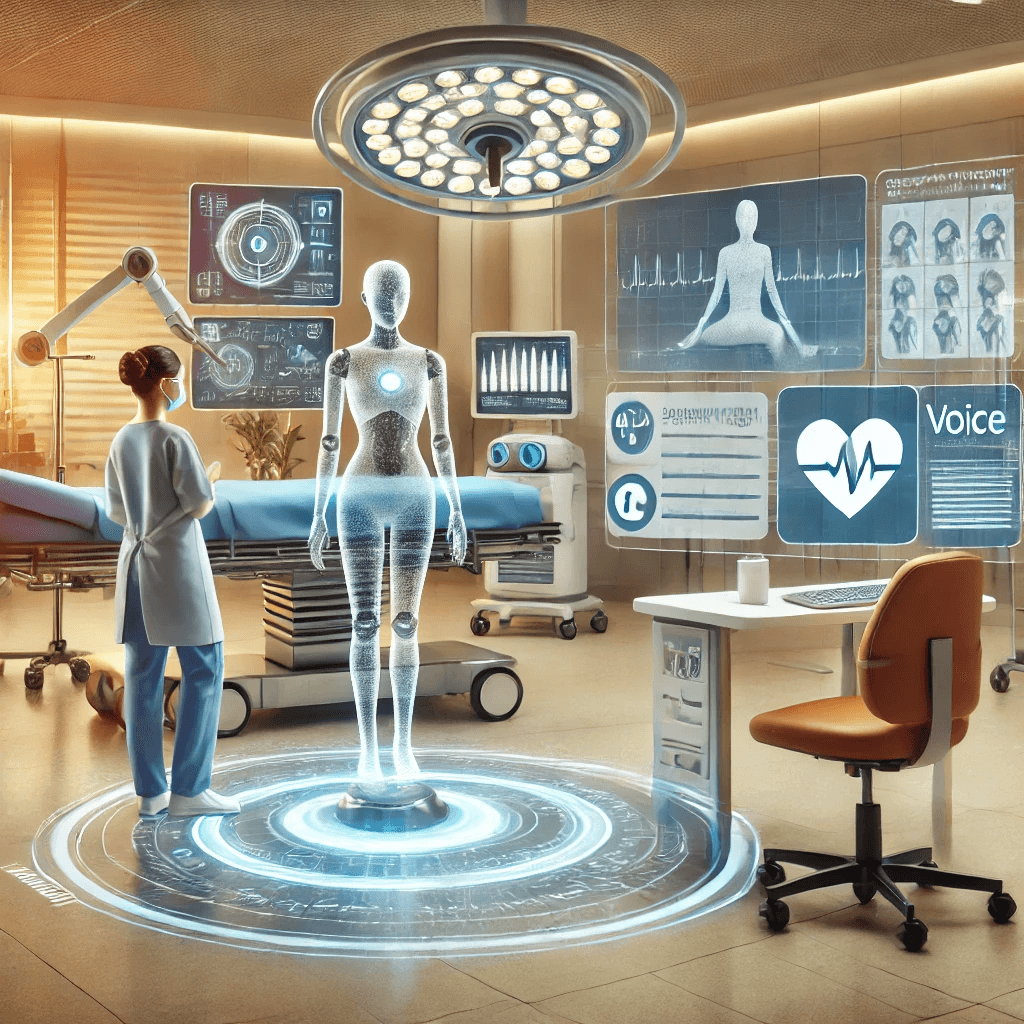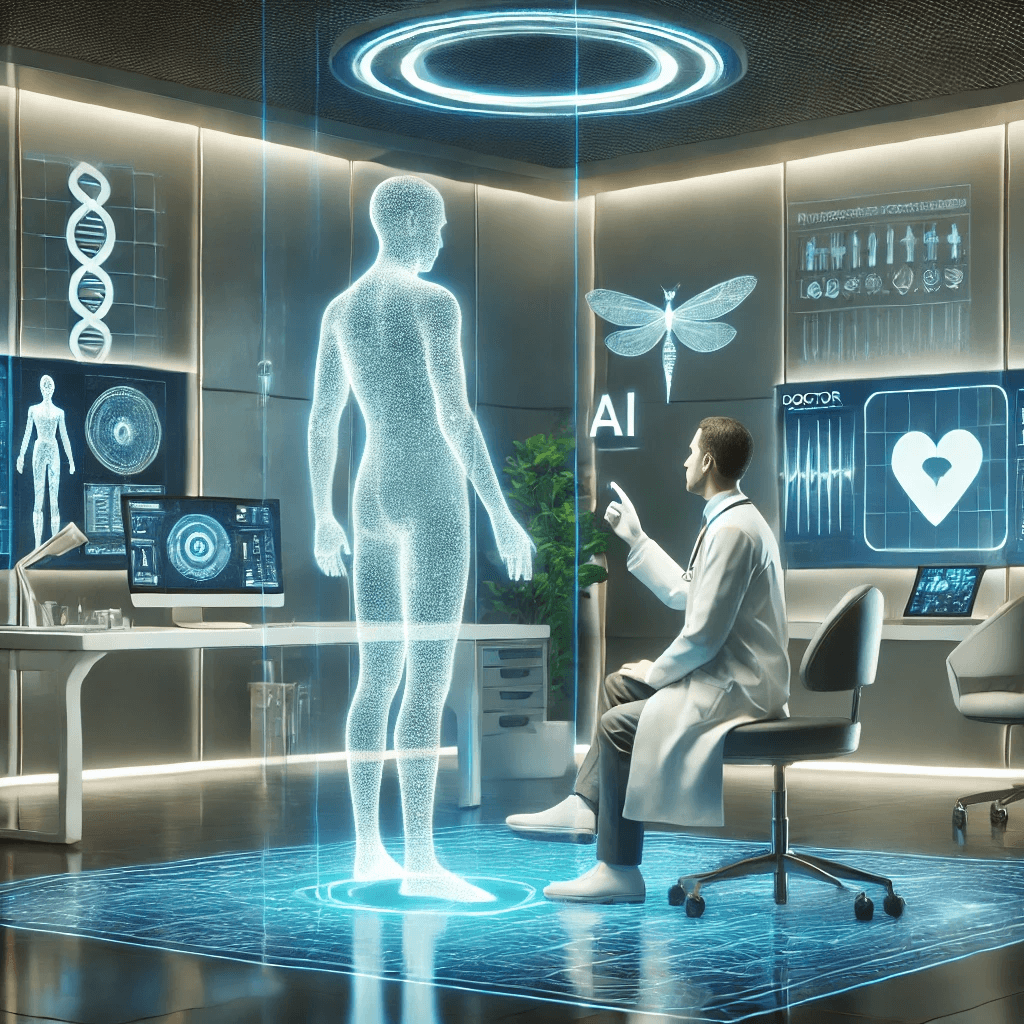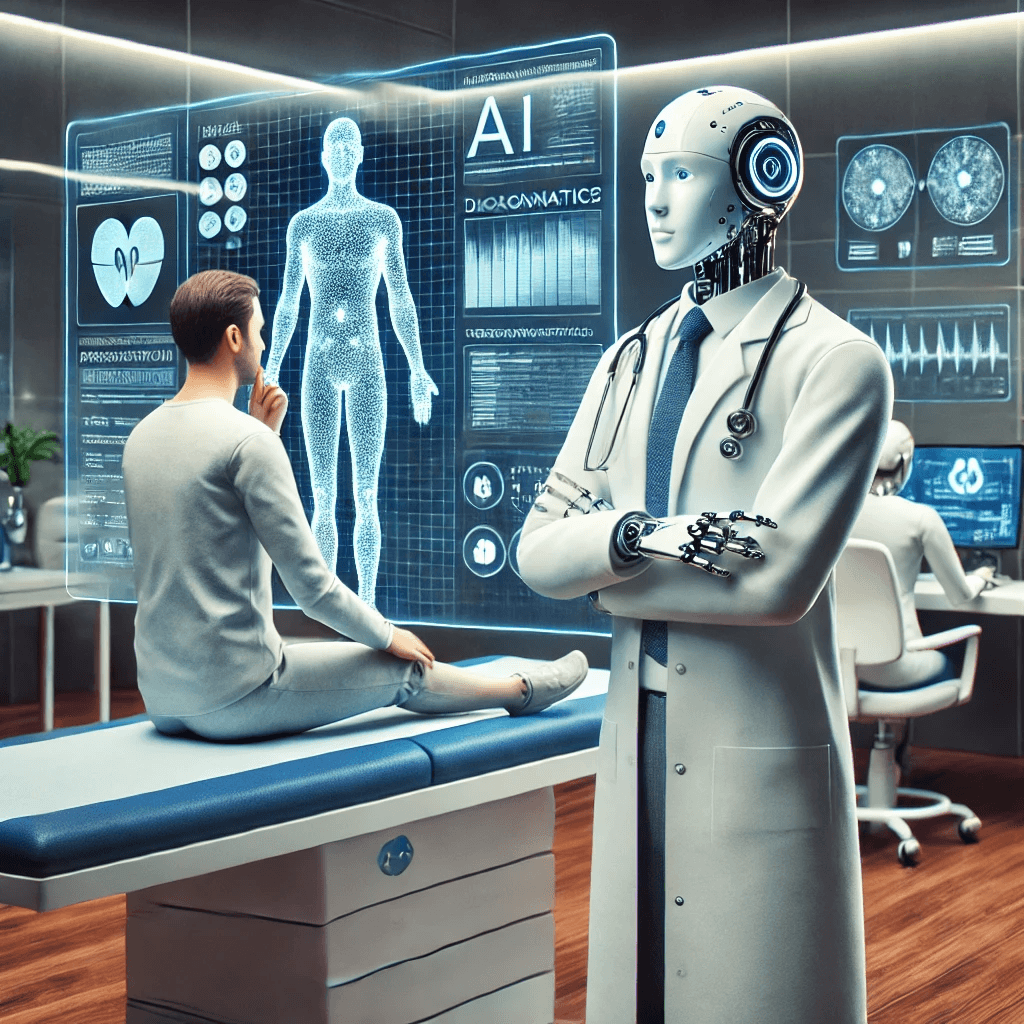AI in Healthcare
AI in Healthcare

Tal Hoffman
Tal Hoffman
Nov 18, 2024
Nov 18, 2024
Nov 18, 2024
The integration of artificial intelligence (AI) in healthcare is ushering in a transformative era, reshaping the way medical professionals diagnose, treat, and monitor patients. This groundbreaking technology not only promises greater efficiency but also heralds the possibility of improved outcomes for patients across the globe. From enhancing diagnostics to streamlining patient care, AI is increasingly proving to be a game-changer.
What Is AI in Healthcare?
At its core, AI in healthcare refers to the application of machine learning, natural language processing (NLP), deep learning, and other AI technologies to enhance various aspects of medical care. AI complements human expertise by analyzing vast datasets, identifying patterns, and providing actionable insights. It bridges the gap between the immense volumes of healthcare data and actionable, efficient solutions.
Machine learning allows systems to identify patterns in clinical data, improving the accuracy of medical predictions. NLP, on the other hand, processes unstructured data—like clinical notes—to make it accessible and actionable. Recent advancements in generative AI (GenAI) have brought these capabilities to the next level, enabling tools that not only process data but also communicate complex information effectively.
Key Applications of AI in Healthcare
1. Revolutionizing Medical Diagnosis
Medical errors remain a significant concern in healthcare, but AI-powered tools offer hope for minimizing diagnostic inaccuracies. AI systems can process radiology images, pathology slides, and even genomic data with remarkable precision. For instance, AI algorithms are capable of detecting subtle changes in imaging that might indicate early stages of diseases like cancer or Alzheimer’s. This early detection capability can save lives by initiating treatment before conditions progress.
Generative AI advancements now allow healthcare systems to provide explanations and insights in conversational formats, making diagnostic tools more accessible for clinicians who lack specialized training in AI.
2. Accelerating Drug Discovery
The traditional drug discovery process is expensive and time-intensive. AI has transformed this process by identifying potential drug candidates and predicting side effects using complex algorithms. By simulating how different compounds interact with human biology, AI significantly shortens the time required to bring a new drug to market. The integration of GenAI tools in drug discovery allows researchers to explore new avenues, hypothesize treatment pathways, and simulate patient responses in silico.
3. Enhancing Personalized Medicine
Personalized medicine tailors treatments to individual patients based on their genetic makeup, lifestyle, and preferences. AI plays a critical role in analyzing the massive datasets needed to predict which treatments will work best for each patient. Recent AI advancements make these processes more dynamic, allowing for real-time adjustments in treatment plans based on patient progress.
4. Streamlining Healthcare Data Management
Electronic Health Records (EHRs) are essential for modern healthcare but often pose challenges due to their complexity. AI enhances the utility of EHRs by automating data entry, identifying patterns, and extracting critical information. NLP algorithms consolidate similar medical terms and identify redundant information, simplifying clinical documentation and analysis.
GenAI takes this further by enabling intuitive search tools that allow clinicians to ask complex queries in plain language and receive summarized insights. This empowers medical teams to make quicker, more informed decisions.
5. AI in Telemedicine
Telemedicine has seen a significant boost in adoption, particularly in recent years. AI enhances telemedicine by enabling real-time monitoring through wearable devices and sensors. These devices collect vital patient data, which AI analyzes to detect anomalies and notify healthcare providers.
Generative AI chatbots now facilitate meaningful interactions between patients and care teams. These bots not only handle routine queries but also provide empathetic responses, schedule appointments, and follow up on treatment adherence, creating a seamless patient experience.
6. Voice AI in Contact Centers
AI contact centers, powered by advanced voice AI and GenAI tools, are transforming patient interactions. These systems can handle complex workflows, such as assisting patients in managing care plans, connecting with family members or caregivers, and coordinating with insurance payors. Voice AI interprets patient inquiries, responds naturally, and escalates issues to human agents when necessary.
AI-powered contact centers ensure that patients and their families receive timely, accurate information. For instance, caregivers can inquire about medication schedules or treatment updates without navigating layers of bureaucracy. Payors can resolve billing or authorization issues efficiently. These systems foster collaboration among all stakeholders in a patient’s care journey, enhancing communication and reducing delays in decision-making.
7. Improving Surgical Precision
AI-assisted robotic systems have revolutionized surgeries by enhancing precision and reducing risks. These systems allow surgeons to operate with high accuracy, minimizing complications and improving recovery times. Real-time data analysis during procedures ensures that surgical teams make optimal decisions.
8. Automating Administrative Workflows
AI is streamlining many administrative tasks in healthcare, from appointment scheduling to claims processing. This automation reduces human error, accelerates workflows, and allows healthcare providers to focus more on patient care. Generative AI tools now assist in creating clear, accessible documentation for insurance claims and compliance reporting.
The Role of AI in Complex Care Coordination
In complex care scenarios, patients often rely on a network of family members, caregivers, and healthcare providers. AI tools help streamline communication among these groups. For example, voice AI in care coordination can provide real-time updates on a patient’s condition, offer reminders for medications, and flag potential health risks.
Generative AI further facilitates this coordination by generating personalized care summaries or predictive insights that anticipate patient needs. By ensuring that everyone involved in a patient’s care has access to the same accurate, up-to-date information, AI reduces miscommunication and improves outcomes.
Benefits of AI in Healthcare
1. Improved Diagnostic Accuracy
AI reduces human error and improves the speed and accuracy of diagnoses, especially in radiology and pathology. Generative AI now enhances these tools by providing explanatory notes alongside diagnostic outputs, making the technology accessible to broader clinical teams.
2. Cost Efficiency
Automation in administrative tasks and drug discovery significantly reduces operational costs. AI tools allow healthcare facilities to allocate resources more effectively, lowering overall healthcare expenses for patients.
3. Better Patient Outcomes
From early disease detection to personalized treatment plans, AI enables more effective care. Patients experience faster recoveries and improved health outcomes due to timely interventions informed by AI analytics.
4. Increased Accessibility
AI-driven telemedicine and contact centers make healthcare accessible to underserved populations, providing remote monitoring and immediate assistance.
Challenges and Ethical Considerations
1. Data Privacy and Security
The use of AI in healthcare necessitates access to vast amounts of sensitive patient data. Protecting this data from breaches and ensuring compliance with regulations like GDPR and HIPAA is paramount.
2. Algorithmic Bias
AI systems must be trained on diverse datasets to avoid biases that could exacerbate disparities in care. For instance, algorithms should account for variations across different demographics to ensure equitable treatment.
3. Acceptance Among Healthcare Providers
The adoption of AI tools requires buy-in from healthcare professionals. Transparent algorithms and user-friendly interfaces are essential to building trust and confidence in these technologies.
The Future of AI in Healthcare
AI’s potential in healthcare is boundless. GenAI, in particular, has opened doors to innovations in predictive analytics, patient engagement, and medical research. As algorithms become more sophisticated, we can expect:
• Enhanced Predictive Care: AI systems will anticipate health issues before they arise, enabling preventative interventions.
• Greater Integration with Wearables: Continuous monitoring through wearables will provide real-time data for AI systems, improving chronic disease management.
• Advanced Contact Centers: Voice AI and GenAI will evolve to handle even more complex workflows, creating a truly patient-centric care model.
The growing reliance on AI also necessitates a focus on training healthcare professionals to work alongside these tools effectively. Collaboration between technology developers and medical practitioners will be key to unlocking the full potential of AI.
Conclusion
AI in healthcare is more than a technological advancement; it’s a paradigm shift that promises to improve care delivery, reduce costs, and enhance patient outcomes. From GenAI-powered diagnostics to voice AI in patient interactions, these tools are reshaping how care is provided and experienced.
As AI continues to evolve, the healthcare industry must balance innovation with ethical considerations, ensuring that these tools are accessible, equitable, and secure. By embracing AI thoughtfully, we can look forward to a future where healthcare is not only smarter but also more compassionate and personalized.
The integration of artificial intelligence (AI) in healthcare is ushering in a transformative era, reshaping the way medical professionals diagnose, treat, and monitor patients. This groundbreaking technology not only promises greater efficiency but also heralds the possibility of improved outcomes for patients across the globe. From enhancing diagnostics to streamlining patient care, AI is increasingly proving to be a game-changer.
What Is AI in Healthcare?
At its core, AI in healthcare refers to the application of machine learning, natural language processing (NLP), deep learning, and other AI technologies to enhance various aspects of medical care. AI complements human expertise by analyzing vast datasets, identifying patterns, and providing actionable insights. It bridges the gap between the immense volumes of healthcare data and actionable, efficient solutions.
Machine learning allows systems to identify patterns in clinical data, improving the accuracy of medical predictions. NLP, on the other hand, processes unstructured data—like clinical notes—to make it accessible and actionable. Recent advancements in generative AI (GenAI) have brought these capabilities to the next level, enabling tools that not only process data but also communicate complex information effectively.
Key Applications of AI in Healthcare
1. Revolutionizing Medical Diagnosis
Medical errors remain a significant concern in healthcare, but AI-powered tools offer hope for minimizing diagnostic inaccuracies. AI systems can process radiology images, pathology slides, and even genomic data with remarkable precision. For instance, AI algorithms are capable of detecting subtle changes in imaging that might indicate early stages of diseases like cancer or Alzheimer’s. This early detection capability can save lives by initiating treatment before conditions progress.
Generative AI advancements now allow healthcare systems to provide explanations and insights in conversational formats, making diagnostic tools more accessible for clinicians who lack specialized training in AI.
2. Accelerating Drug Discovery
The traditional drug discovery process is expensive and time-intensive. AI has transformed this process by identifying potential drug candidates and predicting side effects using complex algorithms. By simulating how different compounds interact with human biology, AI significantly shortens the time required to bring a new drug to market. The integration of GenAI tools in drug discovery allows researchers to explore new avenues, hypothesize treatment pathways, and simulate patient responses in silico.
3. Enhancing Personalized Medicine
Personalized medicine tailors treatments to individual patients based on their genetic makeup, lifestyle, and preferences. AI plays a critical role in analyzing the massive datasets needed to predict which treatments will work best for each patient. Recent AI advancements make these processes more dynamic, allowing for real-time adjustments in treatment plans based on patient progress.
4. Streamlining Healthcare Data Management
Electronic Health Records (EHRs) are essential for modern healthcare but often pose challenges due to their complexity. AI enhances the utility of EHRs by automating data entry, identifying patterns, and extracting critical information. NLP algorithms consolidate similar medical terms and identify redundant information, simplifying clinical documentation and analysis.
GenAI takes this further by enabling intuitive search tools that allow clinicians to ask complex queries in plain language and receive summarized insights. This empowers medical teams to make quicker, more informed decisions.
5. AI in Telemedicine
Telemedicine has seen a significant boost in adoption, particularly in recent years. AI enhances telemedicine by enabling real-time monitoring through wearable devices and sensors. These devices collect vital patient data, which AI analyzes to detect anomalies and notify healthcare providers.
Generative AI chatbots now facilitate meaningful interactions between patients and care teams. These bots not only handle routine queries but also provide empathetic responses, schedule appointments, and follow up on treatment adherence, creating a seamless patient experience.
6. Voice AI in Contact Centers
AI contact centers, powered by advanced voice AI and GenAI tools, are transforming patient interactions. These systems can handle complex workflows, such as assisting patients in managing care plans, connecting with family members or caregivers, and coordinating with insurance payors. Voice AI interprets patient inquiries, responds naturally, and escalates issues to human agents when necessary.
AI-powered contact centers ensure that patients and their families receive timely, accurate information. For instance, caregivers can inquire about medication schedules or treatment updates without navigating layers of bureaucracy. Payors can resolve billing or authorization issues efficiently. These systems foster collaboration among all stakeholders in a patient’s care journey, enhancing communication and reducing delays in decision-making.
7. Improving Surgical Precision
AI-assisted robotic systems have revolutionized surgeries by enhancing precision and reducing risks. These systems allow surgeons to operate with high accuracy, minimizing complications and improving recovery times. Real-time data analysis during procedures ensures that surgical teams make optimal decisions.
8. Automating Administrative Workflows
AI is streamlining many administrative tasks in healthcare, from appointment scheduling to claims processing. This automation reduces human error, accelerates workflows, and allows healthcare providers to focus more on patient care. Generative AI tools now assist in creating clear, accessible documentation for insurance claims and compliance reporting.
The Role of AI in Complex Care Coordination
In complex care scenarios, patients often rely on a network of family members, caregivers, and healthcare providers. AI tools help streamline communication among these groups. For example, voice AI in care coordination can provide real-time updates on a patient’s condition, offer reminders for medications, and flag potential health risks.
Generative AI further facilitates this coordination by generating personalized care summaries or predictive insights that anticipate patient needs. By ensuring that everyone involved in a patient’s care has access to the same accurate, up-to-date information, AI reduces miscommunication and improves outcomes.
Benefits of AI in Healthcare
1. Improved Diagnostic Accuracy
AI reduces human error and improves the speed and accuracy of diagnoses, especially in radiology and pathology. Generative AI now enhances these tools by providing explanatory notes alongside diagnostic outputs, making the technology accessible to broader clinical teams.
2. Cost Efficiency
Automation in administrative tasks and drug discovery significantly reduces operational costs. AI tools allow healthcare facilities to allocate resources more effectively, lowering overall healthcare expenses for patients.
3. Better Patient Outcomes
From early disease detection to personalized treatment plans, AI enables more effective care. Patients experience faster recoveries and improved health outcomes due to timely interventions informed by AI analytics.
4. Increased Accessibility
AI-driven telemedicine and contact centers make healthcare accessible to underserved populations, providing remote monitoring and immediate assistance.
Challenges and Ethical Considerations
1. Data Privacy and Security
The use of AI in healthcare necessitates access to vast amounts of sensitive patient data. Protecting this data from breaches and ensuring compliance with regulations like GDPR and HIPAA is paramount.
2. Algorithmic Bias
AI systems must be trained on diverse datasets to avoid biases that could exacerbate disparities in care. For instance, algorithms should account for variations across different demographics to ensure equitable treatment.
3. Acceptance Among Healthcare Providers
The adoption of AI tools requires buy-in from healthcare professionals. Transparent algorithms and user-friendly interfaces are essential to building trust and confidence in these technologies.
The Future of AI in Healthcare
AI’s potential in healthcare is boundless. GenAI, in particular, has opened doors to innovations in predictive analytics, patient engagement, and medical research. As algorithms become more sophisticated, we can expect:
• Enhanced Predictive Care: AI systems will anticipate health issues before they arise, enabling preventative interventions.
• Greater Integration with Wearables: Continuous monitoring through wearables will provide real-time data for AI systems, improving chronic disease management.
• Advanced Contact Centers: Voice AI and GenAI will evolve to handle even more complex workflows, creating a truly patient-centric care model.
The growing reliance on AI also necessitates a focus on training healthcare professionals to work alongside these tools effectively. Collaboration between technology developers and medical practitioners will be key to unlocking the full potential of AI.
Conclusion
AI in healthcare is more than a technological advancement; it’s a paradigm shift that promises to improve care delivery, reduce costs, and enhance patient outcomes. From GenAI-powered diagnostics to voice AI in patient interactions, these tools are reshaping how care is provided and experienced.
As AI continues to evolve, the healthcare industry must balance innovation with ethical considerations, ensuring that these tools are accessible, equitable, and secure. By embracing AI thoughtfully, we can look forward to a future where healthcare is not only smarter but also more compassionate and personalized.




